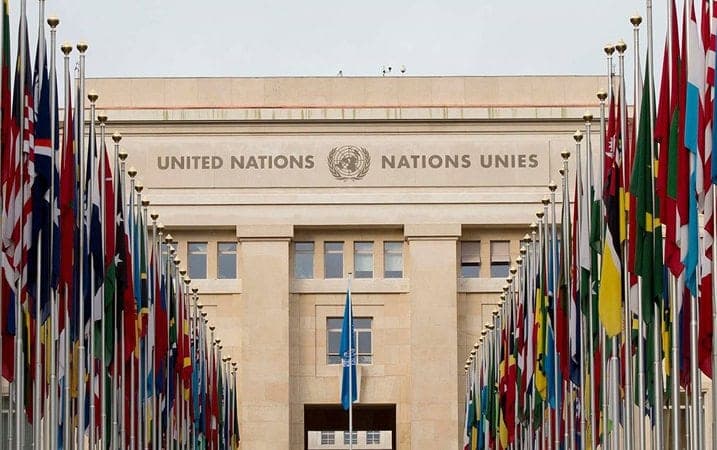Next week Vatican representatives will again testify before a United Nations panel. If the past is prologue, it could be another missed opportunity if the independent experts on the panel grind ideological axes instead of posing legitimate questions that actually fall within their purview.
In early 2014, the Vatican – technically the “Holy See,” the term for the Vatican as a sovereign entity – appeared before two different UN bodies, the Committee on the Rights of the Child and the Committee Against Torture. In both cases, the panels pressed Vatican officials on the child sexual abuse scandals in Catholicism.
Experts wanted to know, for instance, why some priests accused of abuse in Europe or North America were seemingly able to escape punishment by relocating to developing nations, or why Church officials in some areas still resist full collaboration with police and prosecutors.
While insisting the Vatican is not responsible for supervising every one of the world’s 400,000 Catholic priests, a duty that instead falls to local bishops, officials of the Holy See recognized the importance of those questions, and they provided updates on reform efforts, in effect inviting the UN to help in the quest for best practices.
Unfortunately, the constructive conversation that might have started really never got off the ground, in part because UN experts didn’t restrict themselves to such matters.
Instead they indulged their political viewpoints, peppering the Vatican with unsolicited advice on matters such as abortion, same-sex marriage, and contraception. The Committee on the Rights of the Child went so far as to recommend the Vatican repeal a codicil of Church law that prescribes automatic excommunication for participation in an abortion.
Dredging up such matters undercuts the panels’ credibility in two ways.
First, it allows the Vatican and other member states to push back on procedural grounds, arguing that the panels are guilty of “mission creep.” Legally speaking these committees exist to monitor implementation of UN treaties, and they’re not supposed to expand the scope of those agreements to reflect the political viewpoints of panel members.
(There’s a 1969 Vienna Convention on Treaties, the cardinal principle of which is the following: “A treaty shall be interpreted in good faith in accordance with the ordinary meaning to be given to the terms of the treaty in their context and in the light of its object and purpose.”)
Second, by using their positions to deliver a poke in the eye to Catholicism over sexual morality, UN experts embolden resistance to reform inside the Church by making it seem as if even legitimate criticism is part of a broader cultural attack.
All this comes to mind in light of the Vatican’s appearance next week in Geneva before the UN Committee on the Elimination of Racial Discrimination. The Holy See is scheduled to make its presentation on Tuesday and Wednesday, and sometime in mid-December the committee will publish its concluding observations.
(It’s important to note that the Vatican is not being “summoned” because of some perceived failure or crisis. The hearing is part of a routine follow-up process, and the UN panel will also hear from Egypt, Lithuania, Mongolia, Slovenia, and Turkey at the same time.)
Looking at the concluding observations this panel has delivered to other states over the years, it’s a fair question whether they’ll color within the lines.
One could easily anticipate questions to Vatican officials, for instance, about the Catholic Church’s refusal to ordain women as priests, or its opposition to same-sex marriage, or its criticism of so-called gender theory. It’s also possible UN experts could veer into historical debates about colonization and indigenous persons, even the Crusades.
To be clear, these panels see it as their mission to hold governments accountable, and there are areas related to racial justice in the here-and-now where the committee could raise critical questions of the Vatican.
For instance, in some parts of the world there’s still a serious mismatch between the composition of the Church on the ground and at the top.
In Brazil a good chunk of the Catholic population is of African descent, while in India an estimated 60-75 percent of Catholics come from the Dalit and Tribal underclass. In both countries, however, relatively few clergy — and still fewer bishops — are drawn from the ranks of those racial minorities.
Similarly, one might ask about possibly unconscious racial bias in the choice of saints. In India, for instance, a cause for the 2008 martyrs of Kandhamal, victims of the most vicious anti-Christian violence in the early 21st century, is stalled – in part, some observers believe, because they were mostly Dalits, meaning “untouchables” under the old caste system.
Such questions would be closer to fair game, among other things because unlike the supervision of priests, Rome actually is responsible for naming bishops and picking saints.
Despite the religious freedom dilemma involved in a UN panel discussing a Church’s internal choices, most reasonable people – including, by the way, most Vatican officials – likely would see such questions as legitimate from a body devoted to racial justice, and would probably also acknowledge that Catholicism still has some ground to cover in terms of living up to its own rhetoric and commitments in the fight against racism.
If that’s the focus, the committee could kick-start a helpful examination of conscience.
But if the hearing gets bogged down in the stale politics of the wars of culture, the odds of anything good happening will drop significantly.

















